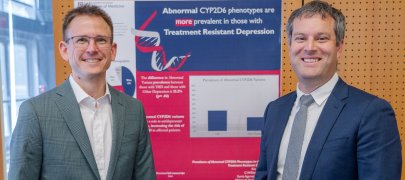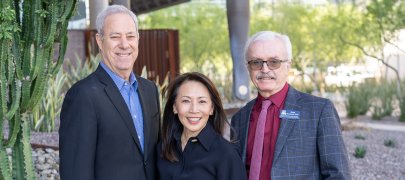Statewide Study to Increase Understanding of Susceptibility to COVID-19 and Recovery Complications
Researchers at the University of Arizona are conducting the first statewide epidemiological cohort study in Arizona that is enrolling COVID-19 patients to better understand susceptibility to infection, the health implications after recovery and the overall impact of COVID-19 on Arizona residents’ health and well-being.
The long-term cohort study is gathering and comparing information from people who have tested positive for the novel coronavirus and from people who were not infected. The project, named Arizona CoVHORT, is enrolling participants and will follow these groups over time to see how COVID-19 has affected their health and well-being. Researchers will also collect information on comorbidities such as cancer, hypertension, and diabetes, as well as sex, race, ethnicity and occupation.
This database, which was started by Kristen Pogreba-Brown, PhD, MPH, and faculty at the UArizona Mel Enid Zuckerman College of Public Health and College of Medicine – Phoenix, will be available for all Arizona investigators to use for current and future research.
“We are using this project to not only establish longitudinal monitoring, but to assess the short-term and long-term health effects of COVID on Arizona residents,” said Pamela Garcia-Filion, PhD, MPH, a research associate professor in Biomedical Informatics at the College of Medicine – Phoenix. “This is extremely important because the project will include the most vulnerable populations, or those that would otherwise not have access to care or testing; this should help bridge the access gap.”
Dr. Garcia-Filion serves as the lead for recruitment in Maricopa County for the Arizona CoVHORT project. The project began in Pima County, led by Dr. Pogreba-Brown, and is recruiting cases confirmed in Pima and are actively expanding their recruitment sources through various outreach. They hope to begin recruiting residents within Maricopa County in June 2020. Dr. Garcia-Filion says that the availability of Arizona CoVHORT is intended to complement contact tracing, the tracing and monitoring of infected individuals, by providing follow-up of residents that have not yet undergone testing but may be asymptomatic or pre-symptomatic.
“Arizona CoVHORT is interested in not only a person’s health status or changes in symptoms, but also in understanding the impact that being a potential contact may have on one’s behavior and well-being,” Dr. Garcia-Filion said.
Participants will complete a baseline online survey about their health that includes experienced symptoms, illness and recovery and measures of well-being. Then, researchers will use periodic follow-up surveys to monitor how their health statuses change over time. If an individual has not developed symptoms, researchers will still monitor for changes that may arise and gather information on how the pandemic has affected Arizona residents’ health, well-being and access to health care. The most accurate way to measure the impact is with a rigorous follow-up and linking of individual data.
The survey only takes 10-15 minutes to complete. In the first year, participants should expect to receive another survey every three months. After that, it may be about 1-2 times per year.
“These results will provide important public health information about residents of Arizona and will influence science and health care practice,” Dr. Garcia-Filion said.
The idea for the study started in March 2020 under the direction of Dr. Pogreba Brown and with the help of Dr. Garcia-Filion at the College of Medicine – Phoenix, Elizabeth Jacobs, PhD, and Kate Ellingson, PhD, who are all faculty at the UArizona Mel Enid Zuckerman College of Public Health.
“From the beginning of the pandemic, there was an immediate need for epidemiological studies that provide key information about the pathogen, its transmissibility and risk factors associated with a severe disease course and recovery,” Dr. Garcia-Filion said. “The field is recognizing that this pandemic affects more than health. We wanted to establish a mechanism that will also measure the pandemic’s effects to one’s well-being. Well-being significantly influences a person’s immunity and risk of poor health. The field is anticipating that COVID-19 is likely to continue for the foreseeable future. With the Arizona CoVHORT, we will be well positioned to truly understand the long-term impacts of COVID from A to Z.”
About the College
Founded in 2007, the University of Arizona College of Medicine – Phoenix inspires and trains exemplary physicians, scientists and leaders to optimize health and health care in Arizona and beyond. By cultivating collaborative research locally and globally, the college accelerates discovery in a number of critical areas — including cancer, stroke, traumatic brain injury and cardiovascular disease. Championed as a student-centric campus, the college has graduated more than 800 physicians, all of whom received exceptional training from nine clinical partners and more than 2,700 diverse faculty members. As the anchor to the Phoenix Bioscience Core, which is projected to have an economic impact of $3.1 billion by 2025, the college prides itself on engaging with the community, fostering education, inclusion, access and advocacy.


